Notre Dame Law School has always had a strong record of graduates securing highly coveted judicial clerkships. The Class of 2022 continued that tradition with a significant increase in clerkship placements.
More than 23% of the 2022 graduates accepted an offer to clerk for a judge, securing a total of 59 clerkships — 49 with federal courts and 10 with state courts. According to American Bar Association data, ND Law’s Class of 2021 ranked 12th among U.S. law schools for securing federal clerkships, with 9% of graduates entering federal clerkships upon graduation.
“At Notre Dame Law School, we take pride in being known for punching above our weight in clerkships, and we are actively working to build that reputation even further,” said Vincent Versagli, the Law School’s director of career development. “The success of the Class of 2022 is a terrific example of that effort.”
Clerkships are prestigious and competitive employment opportunities. Law clerks learn about effective advocacy, sharpen legal reasoning and writing skills, and gain exposure to a wide array of legal practice areas. Trial court clerkships, in particular, provide experience interacting with local attorneys. Clerking also offers the opportunity to develop a lifelong mentoring relationship with a judge.
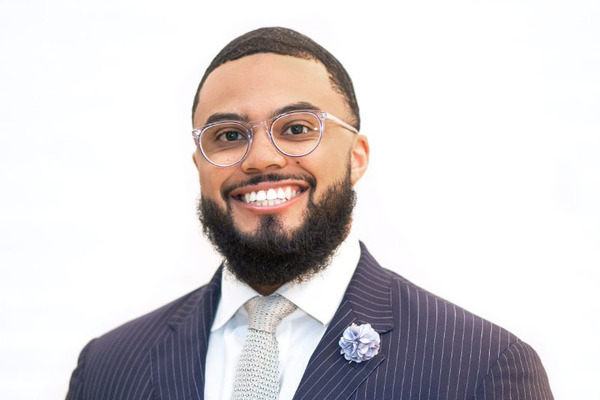
Jaylen Amaker ’22 J.D. is clerking for Judge David J. Hale of the U.S. District Court for the Western District of Kentucky. He will then clerk for Judge Denny Chin of the U.S. Court of Appeals for the Second Circuit during the 2023-2024 term.
“I applied for a clerkship because I value mentorship. Judges are the best of the profession, and I wanted the opportunity to learn at the hands of a master. I also wanted to join a clerkship family of lawyers from different law schools, geographic areas, and practice areas,” Amaker said.
“This opportunity will change my life and inspire and touch the lives of an entire generation,” he said. “The hope is that my story and experience will inspire children in my community to strive for a life outside of the box, recognize their potential, and realize their dreams.”
Faculty support for clerkships
The Law School’s Career Development Office and faculty-led clerkship committee provide a robust level of support to students interested in clerkships and guidance through the application process.
Members of the faculty clerkship committee help students decide if a clerkship is right for them. They then assist students with mapping out an application strategy based on each student’s career goals and aspirations.
The Career Development Office works with students throughout the application process and sends all clerkship applications free of charge. Faculty members conduct mock clerkship interviews for all students who are invited to interview with a judge. In addition, students who secure clerkships are given the opportunity to work one-on-one with a faculty member to prepare to succeed in chambers.
John P. Murphy Foundation Professor of Law Nicole Stelle Garnett, who chairs the clerkship committee, said, “At Notre Dame, we are committed to helping all interested students secure a clerkship and to hit the ground running from day one. All of us who clerked understand what a wonderful, transformational experience clerking can be. We want to do all that we can to ensure that as many students as possible have the opportunity to begin their careers working with a judge as a mentor.”
As students work with the clerkship committee, they often learn about judges or chambers that they may not have otherwise considered.
“My past professional experience taught me that your first boss shapes the trajectory of your career. As I navigated the clerkship process, I sought a judge that could have a similar impact, and I am confident Judge Hale is that person,” said Amaker. “I focused on finding the best opportunity for me regardless of the location. I understand opportunity always does not come in your place of greatest comfort, and you have to be willing to step outside of that. I know sacrifice is a prerequisite for growth.”
‘Opportunity to serve the judiciary’
More than one-third of the Law School's tenure-track faculty members (14 out of 40) have clerked at the U.S. Supreme Court. In addition, 70% of tenure-track faculty members have clerked for a federal district or appellate court, while others have clerked for bodies such as the Supreme Court of Canada, the Iran-U.S. Claims Tribunal, and the Supreme Court of the Federated States of Micronesia.
With this expansive experience among faculty, students are able to get firsthand knowledge about how judges run their chambers and how to prepare for clerkship interviews.
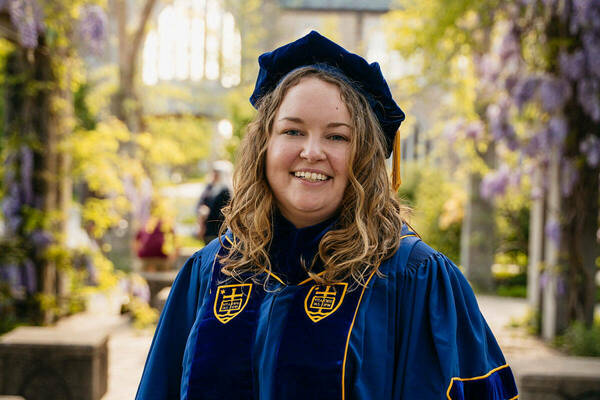
“Clerkship applications are a tough process to navigate, especially for those who do not come into law school with any idea how the process works — or even what the benefits of clerking are," said Jenae Longenecker ’22 J.D. “I am grateful for the support of the faculty who guided me toward both of the judges I will have the privilege of working for. Beyond my own experience, I am excited whenever I see resources at ND Law devoted to opening up these doors to all students, especially first-generation and minority students.”
Longenecker is clerking for Judge John Blakey ’88, ’92 J.D. of the U.S. District Court for the Northern District of Illinois during the 2022-23 term. She will then clerk for Judge Kim Wardlaw of the U.S. Court of Appeals for the Ninth Circuit during the 2023-24 term.
While securing one clerkship is impressive, 10 students, including Longenecker and Amaker, have accepted two clerkship offers.
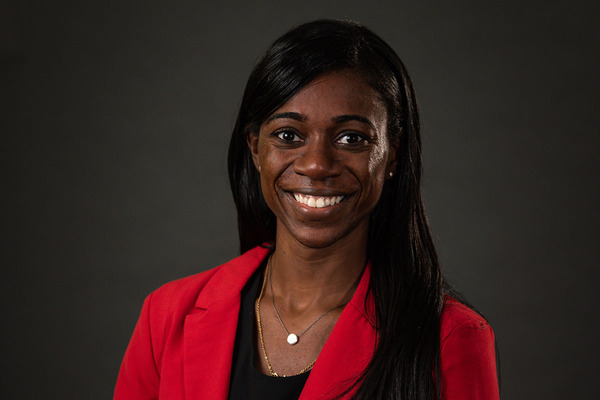
Kathryn A. Boswell Enlow ’22 J.D. is splitting her time as a clerk for Judge Gray Borden and Judge Madeline Haikala, both of the U.S. District Court for the Northern District of Alabama.
“I see clerking as an opportunity to serve the judiciary in a unique way,” said Boswell Enlow. “I am blessed to be able to serve in my hometown and community in such an honorable way. Of course, clerking will expose me to a plethora of new skills that will serve me well throughout my legal career, but aside from the standard takeaways, I am excited to serve my hometown in the pursuit of justice.”
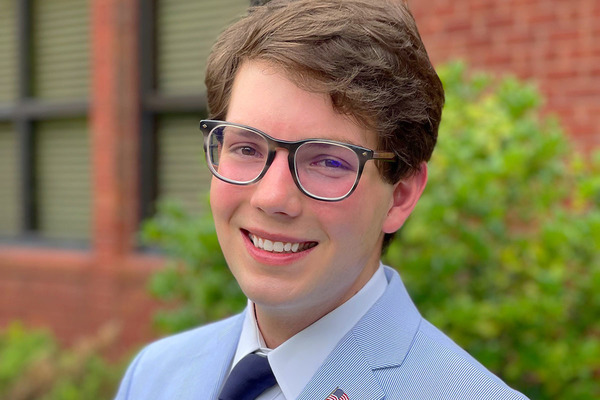
Andrew “Ross” D’Entremont ’22 J.D. has also accepted two clerkships. He is clerking this year for Chief Judge Thomas Schroeder ’84 J.D. of the U.S. District Court for the Middle District of North Carolina. He will then clerk in 2023 for Judge Cory Wilson of the U.S. Court of Appeals for the Fifth Circuit.
“The chance to learn from and work with judges who are considered among the top echelon of our profession is a special opportunity that without Notre Dame and it’s faculty, I might never have experienced," said D'Entremont.
State and specialized courts
The federal clerkships secured by the Class of 2022 include placements on the U.S. Court of Appeals for the Second, Third, Fifth, Sixth, Seventh, Eighth, Ninth, Tenth, and Eleventh circuits. Graduates are clerking for federal district court judges in 14 states as well as Washington, D.C., and Puerto Rico.
This class has also pursued opportunities for clerkships beyond the federal district and appeals courts.
Graduates have secured clerkships on federal specialized courts including the Court of Appeals for the Armed Forces, the Court of Federal Claims, and U.S. Bankruptcy Courts. Nine graduates are clerking for state judges, including two on state supreme courts.
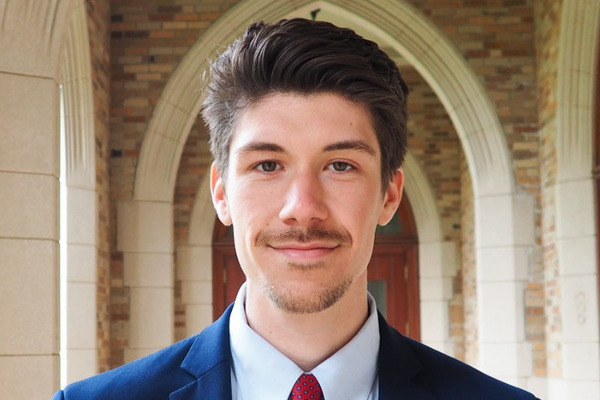
Reid Edwards ’22 J.D. is clerking for Judge John Lopez of the Arizona Supreme Court. Edwards said that clerking for a state supreme court is the most direct way of serving your fellow Americans and making a lasting impact on the legal community.
“You have the same level of impact, if not more, on the state’s citizenry as the U.S. Supreme Court, but remain accountable for your decisions within the community you reside, something I believe is important for judicial decision-making,” Edwards said. “My primary reason for deciding to clerk at a state supreme court was Justice Lopez, himself. I greatly admire the man and the two of us have had a great working relationship, so making the decision to clerk for him over anyone else was really a no-brainer.”
Visit law.nd.edu/clerkships to learn more.
Originally published by at law.nd.edu on September 16, 2022.

